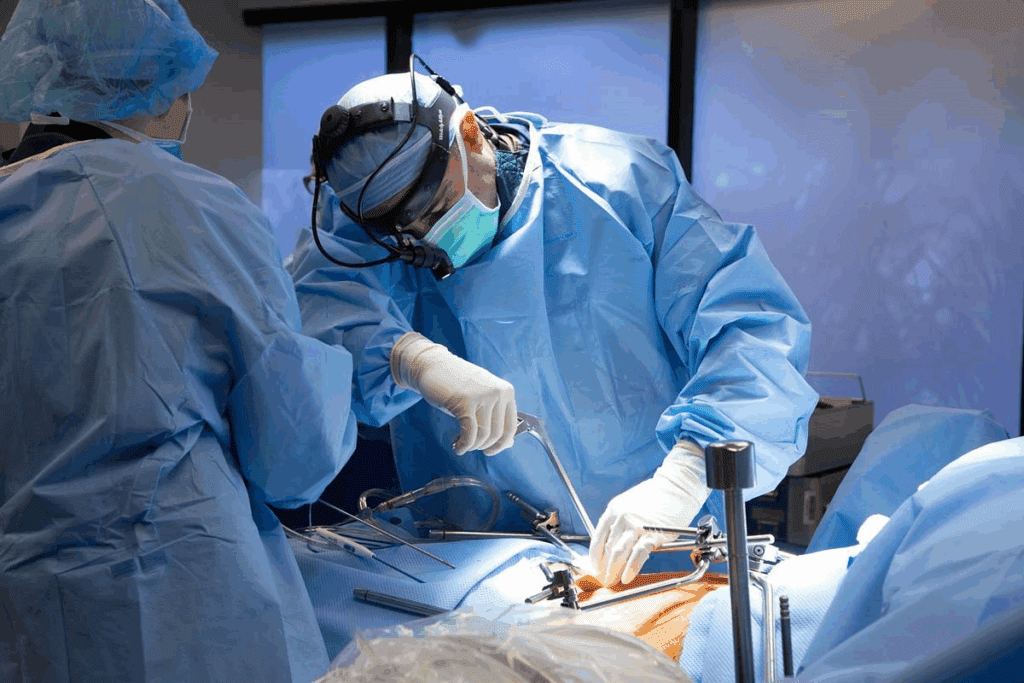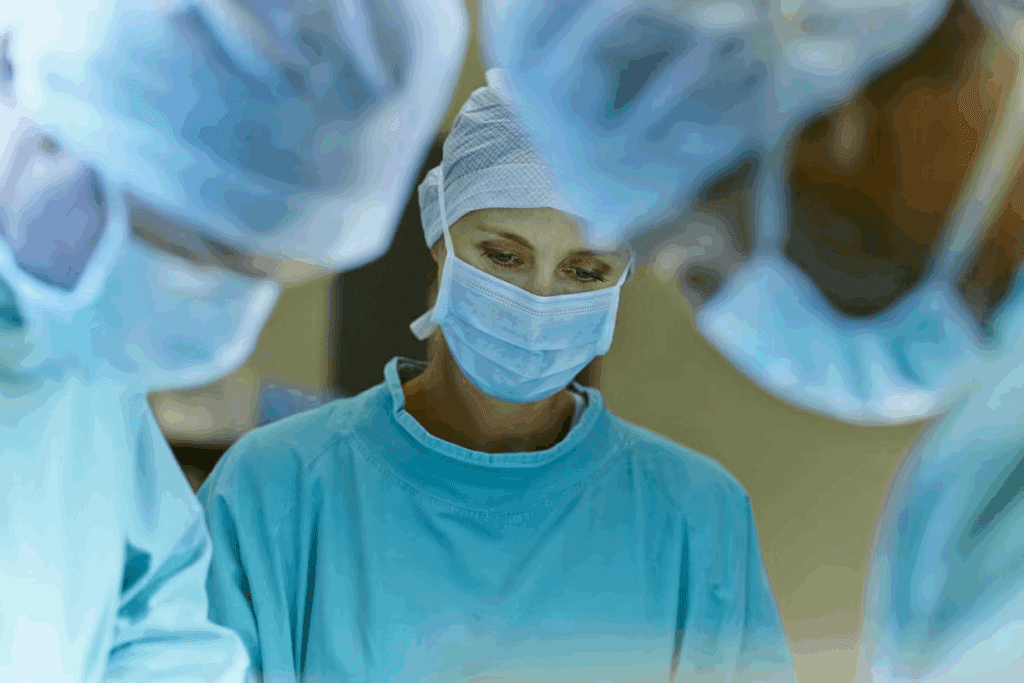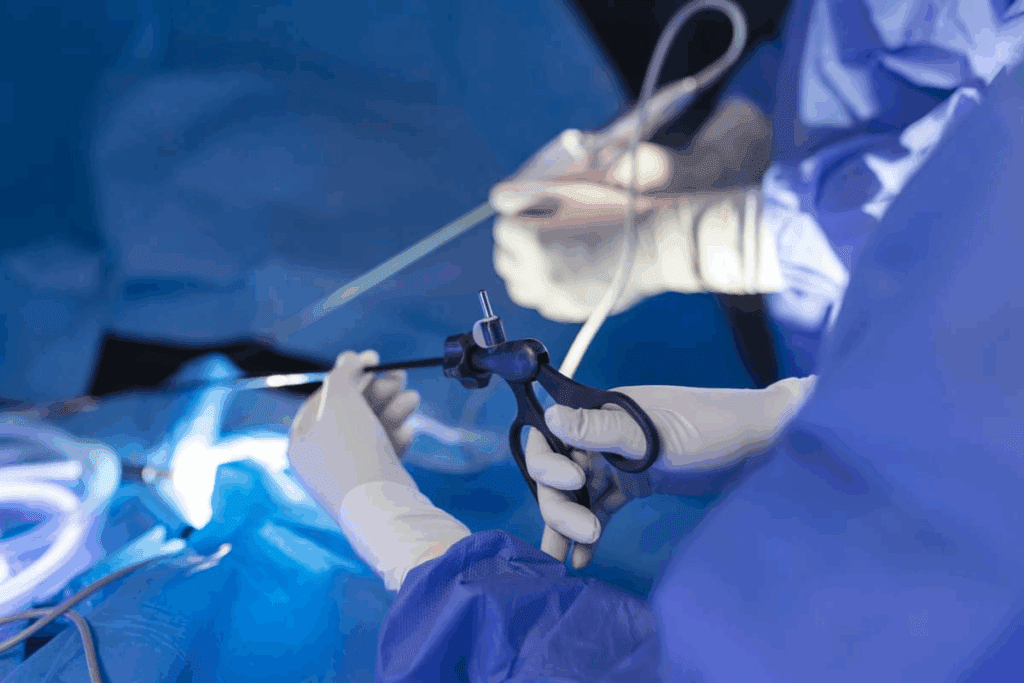Last Updated on November 25, 2025 by Ugurkan Demir

A diagnosis of bladder cancer can be scary. But cystectomy surgery is a key treatment for long-term survival. Preparing for this surgery can be tough. A step-by-step guide on how to prepare for radical cystectomy surgery (complete bladder removal) for bladder cancer.
At Liv Hospital, we mix international medical skills with care for you. We aim to make your preparation smooth and clear. We want you to know what the cystectomy procedure is and what to expect.
Getting ready for radical cystectomy means learning about the surgery and recovery. You’ll also need to make lifestyle changes. We’re here to help you through every step, making sure you’re ready for this important surgery.

For those with muscle-invasive bladder cancer, radical cystectomy is a top choice. It’s a big surgery, and knowing what it is is key.
Radical cystectomy means removing the bladder. It’s mainly for bladder cancer that has grown into the bladder’s muscle. The goal is to take out the cancer and nearby tissues, aiming for a cure.
Choosing radical cystectomy is a big step. It’s a decision made after talking it over with a urologist. It’s a serious choice, with both benefits and risks to think about.
In radical cystectomy, the bladder goes. Sometimes, other organs are removed too, based on the cancer’s spread and the patient’s body. Men might lose the prostate and seminal vesicles. Women might have their ovaries, fallopian tubes, uterus, and part of the anterior vagina removed.
Knowing what’s removed helps patients get ready for life after surgery. It’s about understanding the changes and how they might affect daily life.

We suggest radical cystectomy for certain bladder cancer types or conditions that harm quality of life and survival. This major surgery removes the bladder. It’s chosen when other treatments won’t work.
Radical cystectomy is mainly for muscle-invasive bladder cancer. About 30% of bladder cancer patients have this type. It means the cancer has gone deep into the bladder wall. In these cases, removing the bladder is often the best treatment.
Muscle-invasive bladder cancer is a serious issue. The tumor has reached the muscularis propria of the bladder. This stage needs strong treatment because it can spread and is hard to treat if not caught early. Removing the bladder is often the best way to fight this cancer.
While muscle-invasive bladder cancer is the main reason for radical cystectomy, other issues might also need this surgery. These include:
In summary, radical cystectomy is a key treatment for many urological problems, mainly muscle-invasive bladder cancer. The choice to have this surgery depends on the patient’s health, cancer type and stage, and other important factors.
Radical cystectomy is a complex surgery that removes the bladder and nearby tissues. There are two main ways to do this: open radical cystectomy and minimally invasive radical cystectomy.
Open radical cystectomy uses one big cut in the belly. Minimally invasive surgery, on the other hand, uses smaller cuts and special tools. The choice depends on the patient’s health and the cancer’s stage.
Minimally invasive surgery has many advantages. It leaves less scarring, causes less pain after surgery, and means a shorter stay in the hospital. It also leads to less blood loss and fewer complications.
When you first meet with a urologist, it’s a big step. They will talk about your options and what you can expect. This is your chance to ask questions and get all the information you need.
During this meeting, you’ll learn about the different treatments for bladder cancer. Your doctor will explain the goals of each treatment. They will also talk about the chances of success and any side effects you might face.
It’s important to think about what you want from your treatment. Do you want to cure the cancer, or do you want to manage it? Your doctor will help you understand your options and what they mean for you.
Choosing the right treatment is a personal decision. Your doctor will help you weigh the pros and cons of each option. They will also consider your overall health and what you can handle.
Remember, you’re not alone in this decision. Your doctor is there to guide you and answer any questions you have. They want to make sure you’re comfortable with your choice.
Take your time and think about what you’ve learned. Talk to your doctor again if you have more questions. It’s okay to take your time and make sure you’re making the right choice for you.
A thorough health check is key to see if a patient is ready for radical cystectomy. It finds any risks and makes sure patients are healthy enough for surgery.
Patients get many tests before radical cystectomy to check their health. These tests include:
Before surgery, patients might need to change their medications to lower risks. This includes:
By managing medications and doing the required tests, patients can lower their risk of problems and improve their outcome after radical cystectomy.
After a radical cystectomy, patients face several urinary diversion choices. These choices depend on health, lifestyle, and personal preferences.
An ileal conduit is a common choice. It uses a part of the intestine for urine to leave the body. This method is simpler and has a quicker recovery time.
Neobladder reconstruction is more complex. It makes a new bladder from intestine. This option allows for more natural urination, making it appealing to some.
A continent urinary reservoir creates a pouch for urine. It needs catheterization for drainage. This option offers more control over urination.
Each option has its pros and cons. Patients should talk to their healthcare provider to find the best treatment for them.
Preparing for radical cystectomy means making lifestyle changes. These changes can greatly affect your recovery and health. Eating well, staying active, and managing stress are key. They can help you heal faster and lower the chance of problems.
Eat foods that are full of nutrients. Include fruits, vegetables, whole grains, and lean proteins. This diet helps your body recover by giving it what it needs.
Start with gentle exercises like walking or yoga. These can make your body stronger. Always talk to your doctor before starting any new exercise.
Use stress-reducing activities like meditation or deep breathing. These can help you handle stress and anxiety better.
By changing your lifestyle and following your doctor’s advice, you can get better faster. Radical cystectomy recovery will be easier.
Preparing for a hospital stay and recovery is key. Here are some essential steps to take:
By following these steps, you can make your hospital stay and recovery smoother. It helps you focus on getting better.
Mental preparation is just as important as physical when facing radical cystectomy surgery. The journey can be emotionally tough. Being mentally ready can greatly affect your recovery and well-being.
Radical cystectomy surgery can make you feel anxious and worried. You might think about the surgery’s outcome, possible problems, and how it will change your life. Acknowledging these feelings is the first step to managing them.
Dealing with surgery anxiety needs a few strategies. Here are some ways to help:
As one patient shared, “
The support from my family and counseling was priceless. It helped me face the emotional hurdles of my surgery.
“
Support groups and counseling are key for emotional support. They let you share, get advice, and connect with others facing similar issues.
| Resource | Description | Benefits |
| Support Groups | Meetings or online forums where patients share their experiences. | Emotional support, practical advice, sense of community. |
| Counseling Services | Professional counseling to address emotional and psychological needs. | Personalized support, coping strategies, stress management. |
We suggest looking into these resources for radical cystectomy preparation. Seeking emotional support shows strength. It can greatly help your recovery journey.
It’s important for patients to know about the possible complications of radical cystectomy. This knowledge helps them prepare for the recovery journey. While the surgery is life-saving, knowing the risks can make recovery easier.
Patients may face several challenges after radical cystectomy. These include infection, bleeding, and issues with urinary diversion. Infections are a big risk after surgery. Look out for fever, chills, or more pain and tell your doctor right away.
Bleeding can also be a problem, showing as heavy bleeding or blood clots. While some bleeding is normal, too much needs quick medical help. Problems with the urinary system, like leaks or blockages, can also happen.
Knowing the warning signs of complications is key. Look out for severe abdominal pain, vomiting, fever above 101.5°F, and increased redness or swelling around the surgical site. Also, watch your urine output and report any big changes.
Keep an eye on your overall recovery too. If you notice anything odd or have concerns, reach out to your doctor. Catching and treating complications early can greatly improve your surgery’s outcome.
Getting ready for radical cystectomy is key for a good outcome in bladder cancer treatment. We’ve talked about how important it is to understand the surgery, make lifestyle changes, and plan for aftercare.
Recovering from cystectomy surgery takes time and patience. It’s important to slowly get back to normal activities. With the right care and support, patients can overcome the tough parts of recovery.
Good bladder cancer surgery is more than just the operation. It also includes careful preparation before and after. Knowing about different cystectomy procedures and urinary options helps patients make smart choices.
We urge patients to stay active in their treatment. Ask questions and seek help when you need it. With the right attitude and preparation, patients can have a successful recovery and better quality of life.
Radical cystectomy is a surgery to remove the bladder and nearby tissues. It also removes lymph nodes. This is a main treatment for bladder cancer, mainly for muscle-invasive cases.
It’s often needed for muscle-invasive bladder cancer. This surgery removes the cancer and stops it from spreading. It’s also considered for high-risk non-muscle-invasive cases.
There are open cystectomy, minimally invasive surgery, and robotic-assisted surgery. Each has its own benefits and drawbacks. It’s important to talk to a urologist about which one is best for you.
Options include ileal conduit, neobladder reconstruction, and continent urinary reservoir. The right choice depends on your health and should be discussed with a doctor.
You’ll need medical checks, to adjust medications, and follow diet and exercise advice. Quitting smoking and drinking less alcohol is also important.
Complications can include infections, bowel obstructions, and urinary issues. Knowing the signs and having a plan for managing them is key.
You can join support groups, try relaxation techniques, and talk to your doctor. Mental and emotional preparation is vital for a smooth recovery.
Eating well, staying active, quitting smoking, and drinking less alcohol can help. These changes can improve your recovery and health.
Pack for the hospital, set up your home for recovery, and arrange for care and support. A well-prepared recovery space can help your healing.
Tests are key to check your health, find risks, and ensure the best outcome. They may include blood work and imaging studies.
Deciding on surgery with other health conditions depends on your specific conditions. A doctor’s thorough evaluation is needed to decide the best action.
Radical cystectomy removes the bladder, tissues, and lymph nodes. Simple cystectomy removes only the bladder. Radical cystectomy is more common for cancer treatment.
Recovery time varies based on your health and the type of urinary diversion. Generally, it takes several weeks to months for full recovery.
Reference
Enhanced recovery after surgery of patients undergoing radical cystectomy for bladder cancer; NCBI – https://pmc.ncbi.nlm.nih.gov/articles/PMC7807364/
Subscribe to our e-newsletter to stay informed about the latest innovations in the world of health and exclusive offers!